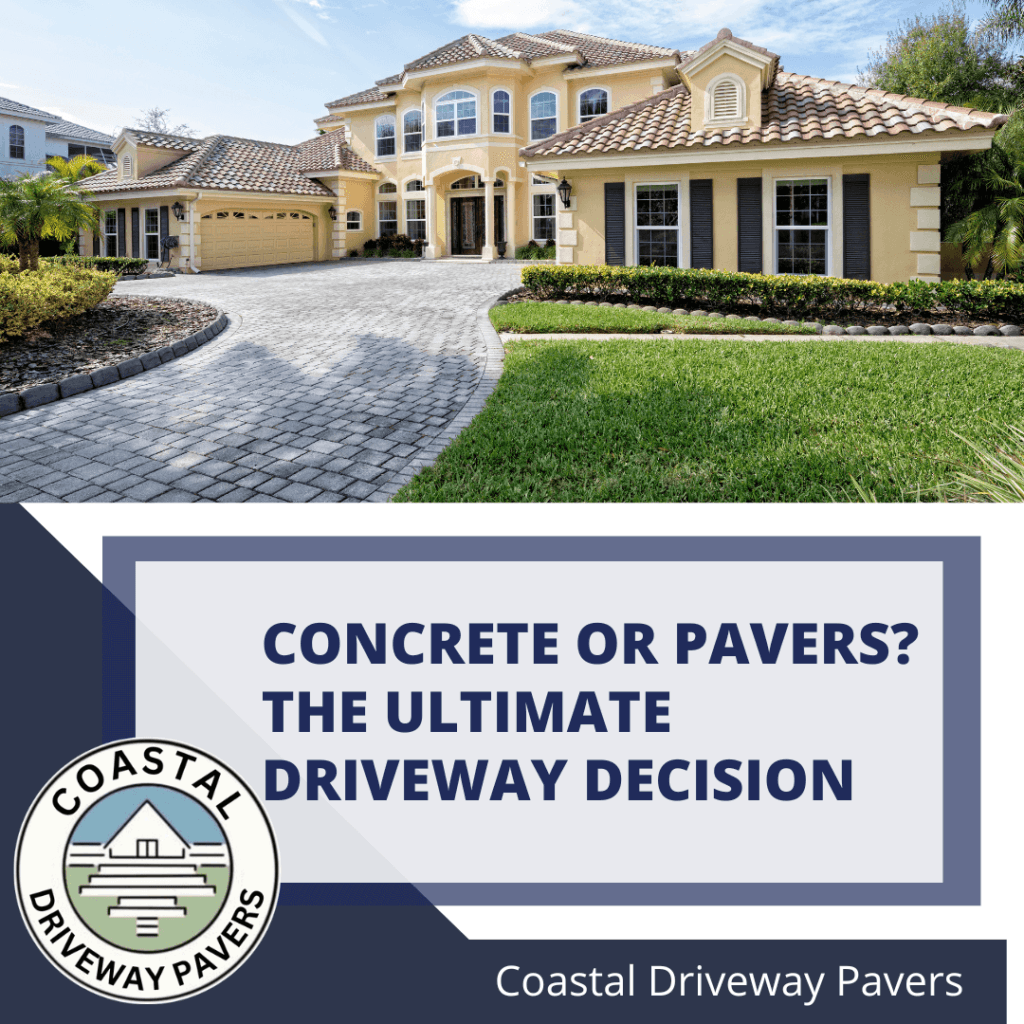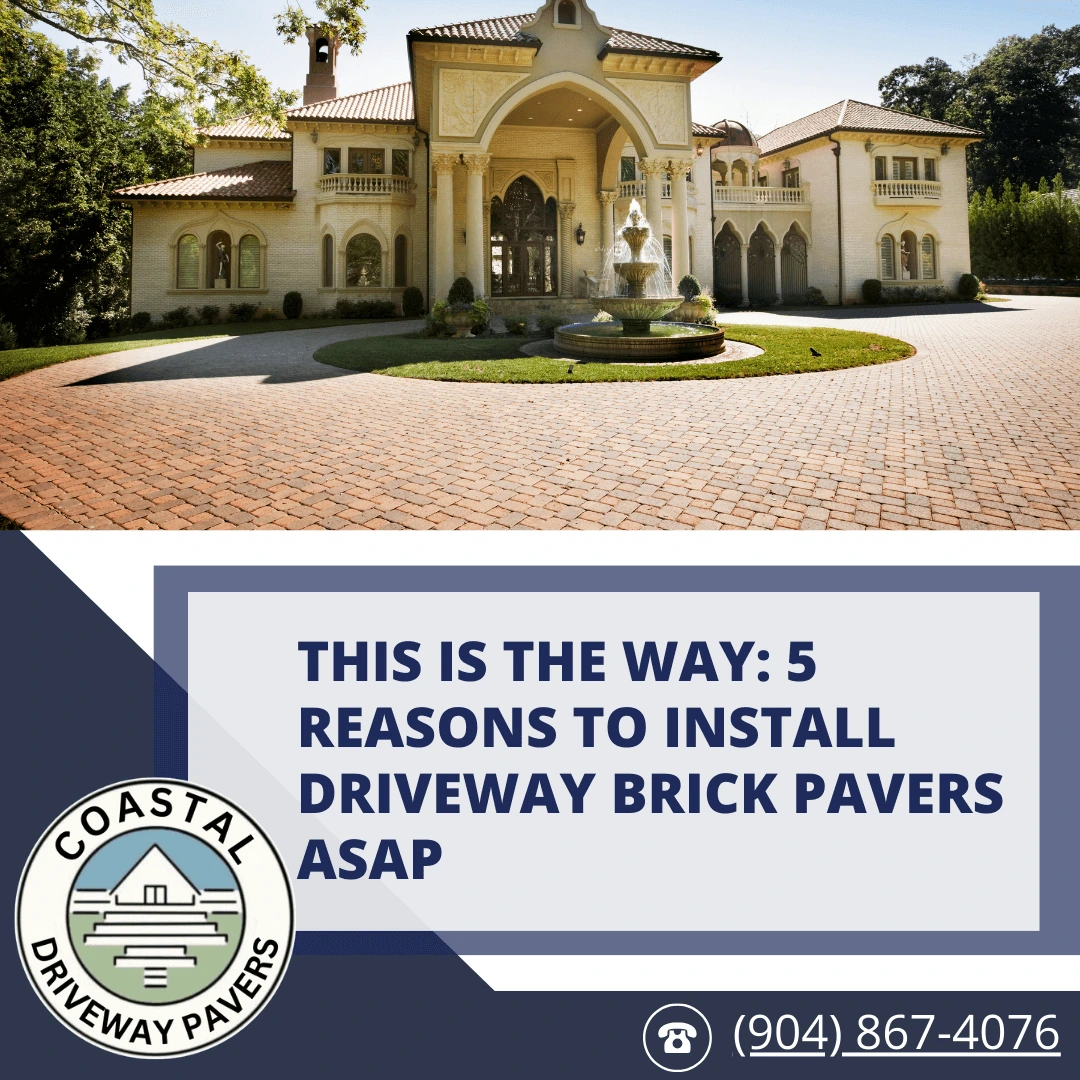When it comes to choosing between concrete or pavers for your driveway, making the right choice can feel overwhelming. Both options have their unique benefits and considerations. Understanding these can help you make an informed decision that suits your needs and budget.
Do you want to learn more about the pros and cons of each option? Continue reading to discover which material is the best fit for your driveway!
Understanding Concrete and Pavers For Driveways
Choosing the right material for your driveway is important. Concrete and pavers are both great options, each with its own benefits.
Concrete is a solid slab, poured and left to cure, forming a single, continuous surface. It is also less expensive than pavers. Concrete can be shaped and colored to fit your design, but it can crack over time, and fixing it can be tough.
Pavers are small, individual pieces made from materials like concrete, brick, or stone. They come in many colors and shapes, making them perfect for creative designs. Pavers are very durable and easy to repair; if one gets damaged, you can replace it without touching the others. However, pavers can be more expensive and need more upkeep to prevent weeds and keep them level.
Choosing between concrete and pavers depends on your needs and budget. Concrete is good for those looking for a cost-effective, durable solution. Pavers are ideal if you want a unique look and easy repairs, even though they might cost more.
For expert advice and installation, Coastal Driveway Pavers can help you choose the best material and create a beautiful driveway that fits your home.
The Benefits of Concrete
Concrete is a popular choice for many construction projects due to its numerous benefits. Here’s a closer look at why concrete is favored by so many.
Durability and Longevity
Concrete is known for its strength and ability to withstand heavy loads and harsh weather conditions. This makes it a reliable material for long-lasting structures. Whether it’s for driveways, patios, or buildings, concrete ensures that the structure remains sturdy and safe for many years all information is available via this link.
Low Maintenance
One of the great advantages of concrete is its minimal maintenance requirement. Unlike other materials that may need regular upkeep, concrete remains in good condition with minimal effort. Simple cleaning and occasional sealing are usually enough to keep concrete surfaces looking good and functioning well.
Design Options
Concrete offers a wide variety of design possibilities. It can be stamped, colored, and textured to mimic other materials like stone or brick. This versatility allows homeowners and builders to achieve the desired aesthetic without compromising on durability.
Cost Efficiency
Concrete is an affordable material compared to many other construction options. Its long lifespan and low maintenance needs further enhance its cost efficiency. Investing in concrete can save money in the long run, making it a budget-friendly choice for many projects.
Concrete’s combination of durability, low maintenance, design flexibility, and cost efficiency makes it a top choice for various applications. Concrete offers reliable and attractive driveway solutions to every home.
The Advantages of Pavers
Design Flexibility
Pavers offer unmatched design flexibility. They come in various shapes, colors, and sizes, allowing homeowners to create unique patterns and designs. Whether you prefer a contemporary design or a classic feel, pavers can be arranged to match your vision.
Ease of Repair
One of the main advantages of pavers is their ease of repair. If a paver gets damaged, it can be replaced individually without disturbing the surrounding area. This makes maintenance simple and cost-effective, ensuring your patio looks great for years to come.
Aesthetically Pleasing
Pavers are known for their aesthetic appeal. They provide a clean, polished look that enhances the beauty of any outdoor space. With a variety of styles available, pavers can complement any home’s architecture and landscape, adding to the overall curb appeal.
Durability
Durability is another key benefit of pavers. They are designed to withstand heavy loads and harsh weather conditions. Pavers are less likely to crack than concrete slabs, making them a long-lasting solution for patios, driveways, and walkways.
Pavers offer design flexibility, ease of repair, aesthetic appeal, and durability, making them a superior choice for many outdoor projects.
Factors to Consider When Choosing Between Pavers vs. Concrete
When choosing between concrete and pavers for your driveway, there are several factors to consider. Here’s a guide to help make the decision easier:
Budget
Concrete is generally less expensive than pavers upfront. However, pavers might offer better long-term value because they are easier to repair. If a paver is damaged, you can replace it individually, whereas repairing concrete might involve replacing a large section.
Style and Design Preferences
Pavers come in a variety of colors, shapes, and patterns, allowing for more design flexibility. They can mimic the look of natural stone, brick, or even wood. Concrete can be stained or stamped to add texture and color, but it may not offer as many options as pavers.
Climate and Weather Conditions
In areas with extreme temperature changes, pavers are often a better choice. They can expand and contract without cracking. Concrete, on the other hand, is more prone to cracking in such conditions. For regions with heavy rainfall, pavers allow for better drainage, reducing the risk of water pooling.
Usage and Foot Traffic
Consider how much foot traffic the area will get. Pavers are more durable and can handle heavy use without significant wear and tear. Concrete might show signs of wear faster in high-traffic areas. For driveways, pavers are usually the preferred option due to their strength and durability.
Maintenance Requirements
Concrete requires sealing every few years to protect against stains and damage. If it cracks, repairs can be costly and noticeable. Pavers require less maintenance. Weeds can grow between them, but using polymeric sand can minimize this issue. Cleaning and resealing pavers every few years will keep them looking fresh.
By considering these factors, you can choose the best material for your patio that fits your budget, style, and practical needs.
Comparing Concrete vs Paver Driveway Costs
Concrete Costs
Concrete is a popular choice for driveways due to its affordability and durability. Here are the key cost factors:
- Materials: The average cost of concrete is relatively low. On average, you can expect to pay between $3 to $6 per square foot for basic concrete. This price includes the concrete mix and delivery.
- Labor: Installing concrete requires skilled labor, especially for pouring and finishing. Labor costs can range from $2 to $3 per square foot.
- Additional Costs: For decorative finishes like stamping, staining, or engraving, expect to pay an additional $2 to $5 per square foot. These finishes enhance the look but increase the overall cost.
In total, a basic concrete driveway installation typically costs between $5 to $10 per square foot.
Paver Costs
Pavers offer a versatile and attractive option for driveways, but they come at a higher price point. Here’s a breakdown of the costs:
- Materials: Pavers are more expensive than concrete. Basic paver materials range from $5 to $10 per square foot. Premium pavers can cost up to $20 per square foot or more.
- Labor: Installing pavers is labor-intensive due to the need for precise placement and fitting. Labor costs for paver installation range from $6 to $10 per square foot.
- Additional Costs: Pavers require a well-prepared base, which can add $1 to $3 per square foot to the total cost. This includes excavation, base material, and sand.
In total, the average cost to install a paver driveway generally ranges from $12 to $30 per square foot.
Concrete is a cost-effective option for those on a budget, while pavers offer more design flexibility and a high-end look at a higher price.
Related Article: Paver vs Concrete Driveway Cost: A Detailed Comparison
Installation Process and Timeframe
Concrete Installation
- Preparation: The area is cleared of any debris and vegetation. A base is prepared by digging to the required depth and laying down a gravel layer for drainage.
- Formwork Setup: Wooden or metal forms are set up to shape the edges of the concrete area. These forms ensure the concrete is poured to the correct dimensions and holds its shape until it sets.
- Pouring Concrete: The concrete mix is poured into the prepared area. It is spread evenly using rakes and shovels. The surface is smoothed out using tools like screeds and floats.
- Curing Time: Concrete needs time to cure and gain strength. This process can take around 24-48 hours for initial setting, but full curing can take up to 28 days. During this time, the surface is kept moist to prevent cracks.
Paver Installation
- Planning and Design: The layout is planned, and the design is marked on the ground. Measurements are taken to ensure the correct amount of materials is ordered.
- Excavation and Base Preparation: The area is excavated to a depth of 6-8 inches. A layer of gravel is spread and compacted to provide a stable base. Sand is added on top and leveled to create a smooth surface for the pavers.
- Laying Pavers: Pavers are placed one by one, starting from one corner and working outward. They are tapped into place with a rubber mallet, and spacers are used to maintain even gaps between pavers.
- Filling Gaps and Compacting: Sand is brushed into the gaps between the pavers to lock them in place. The entire area is then compacted with a plate compactor to ensure the pavers are set firmly and evenly.
- Final Touches: Additional sand may be added and brushed in to fill any remaining gaps. The surface is checked for level and any adjustments are made as needed.
The complete paver installation process takes 3-5 days, depending on the size and complexity of the project. This includes planning, excavation, base preparation, laying the pavers, and final touches.
Both installation processes have their unique steps and requirements. Concrete installation involves a longer curing time, whereas paver installation can be quicker but requires precise placement and leveling.
Final Thoughts
Deciding between concrete or pavers for your driveway can be challenging, but understanding their benefits and drawbacks helps make an informed choice. Concrete is cost-effective, durable, and versatile, making it a great option for those on a budget. However, it can crack and has limited design options.
On the other hand, pavers offer unmatched design flexibility, ease of repair, and high durability. While they are more expensive and require more maintenance, the aesthetic appeal and long-term value can be worth the investment.
Ultimately, the best choice depends on your budget, personal preferences, climate, and maintenance willingness. Both materials have unique advantages, ensuring you can find the perfect solution for your driveway.
For expert installation of driveways, contact Coastal Driveway Pavers. Their paver installers will help you create a beautiful, durable driveway that suits your needs and enhances your home’s curb appeal.
Frequently Asked Questions
Concrete is generally cheaper upfront compared to pavers. Pavers cost more due to the material and installation process.
Pavers are often better because they are easier to repair and offer more design options. Stamped concrete can look nice but might crack and be harder to fix.
Both can last a long time if maintained properly. However, pavers are usually more durable and less likely to crack compared to concrete.
Concrete is usually cheaper than block paving. Block paving costs more due to the individual blocks and the labor needed to install them.

Written By:









